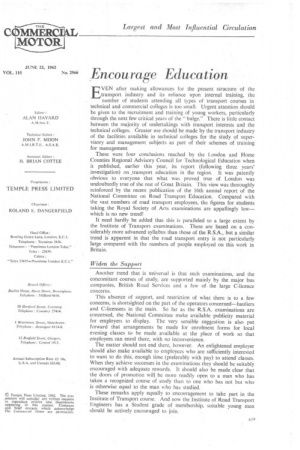.Encourage Education
Page 25

If you've noticed an error in this article please click here to report it so we can fix it.
EVEN after making allowances for the present structure of the transport industry and its reliance upon internal training, the number of students attending all types of transport courses in technical and commercial colleges is too small. Urgent attention should be given to the recruitment and training of young workers, particularly through the next few critical years of the " bulge." There is little contact between the majority of undertakings with transport interests and the technical colleges. Greater use should be made by the transport industry of the facilities available in technical colleges for the study of supervisory and management subjects as part of their schemes of training for management These were four conclusions reached by the London and Home Counties Regional Advisory Council for Technological Education when it published, earlier this year, its report (following three years' investigation) on _transport education in the region, it was patently obvious to everyone that what was proved true of London was undoubtedly true of the rest of Great Britain. This view was thoroughly reinforced by the recent publication of the 16th annual report of the National Committee on Road Transport Education. Compared with the vast numbers of road transport employees, the figures for students taking the Royal Society of Arts examinations are appallingly low— which is no new trend!
It need hardly be added that this is paralleled to a large extent by the Institute of Transport examinations. These are based on a considerably more advanced syllabus than those of the R.S.A., but a similar trend is apparent in that the road transport entry is not particularly large compared with the numbers of people employed on this work in Britain.
Widen the Support
Another trend that is universal is that such examinations, and the concomitant courses of study, are supported mainly by the major bus companies, British Road Services and a few ofthe large C-licence concerns.
This absence of support, and restriction of what there is to a few concerns, is shortsighted on the part of the operators concerned—hauliers and C-licensees in the main. So far as the R.S.A. examinations are concerned, the National Committee make available publicity material for employers to display. The very sensible suggestion is also put forward that arrangements be made for enrolment forms for local evening classes to be made available at the place of work so that employees can enrol there, with no inconvenience.
The matter should not end there, however. An enlightened employer should also make available to employees who are sufficiently interested to want to do this, enough time (preferably with pay) to attend classes. When they achieve successes in the examinations they should be suitably encouraged with adequate rewards. It should also be made clear that the doors of promotion wiIl. be more readily open to a man who has taken a recognized course of study than to one who has not but who is otherwise equal to the man who has studied.
These remarks apply equally to encouragement to take part in the Institute of Transport course. And now the Institute of Road Transport Engineers has a Student grade of membership, suitable young men should be actively encouraged to join.












































































































